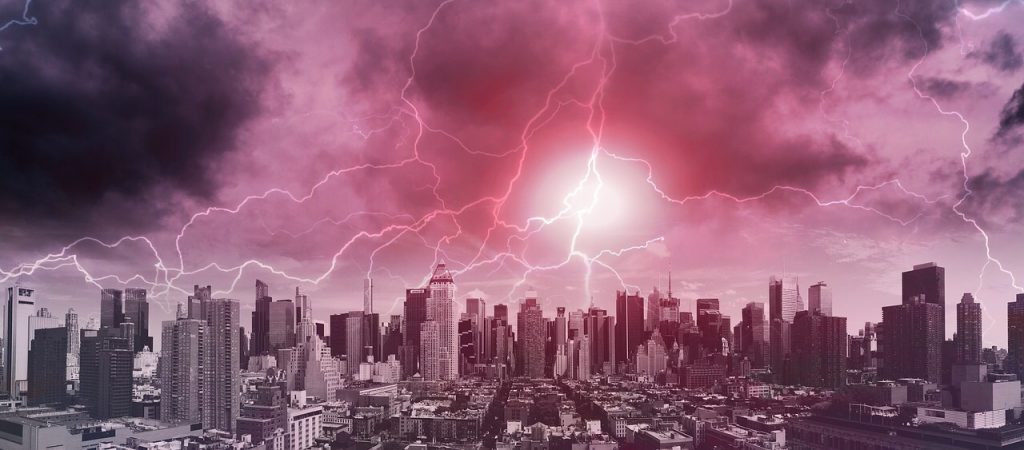Large Solar Storm Will Hit Earth On At The Same Time That The “Black Supermoon” Happens

An absolutely massive hole has formed in the upper atmosphere of the Sun, and our planet will align with that hole later this week. Once the alignment happens, Earth will be bombarded by a “solar storm”, and nobody is quite sure yet how bad it will be. If the storm is relatively minor, we could just experience a few disruptions to satellite communications and see some pretty lights in the sky. But if the storm is really severe, our electrical grid could be fried and we could experience widespread power outages. According to the Express, “the solar storm will hit Earth on July 31 or August 1″…
Earth’s orbit around the Sun will soon align with a coronal hole – a hole in the Sun’s upper atmosphere – and solar particles will subsequently bombard the planet after they have made their way through space. Experts predict that the solar storm will hit Earth on July 31 or August 1. People in the northern hemisphere are likely to be treated to northern lights – or aurora borealis – as the solar winds bombard the upper reaches of the planet.
Of course North America is in the northern hemisphere, and so we could be in for a direct hit.
Since our satellites are outside our atmosphere, they are the most vulnerable during a solar storm. If some of our satellites get fried, that could affect GPS navigation, cell phone communication, and satellite television services…
For the most part, the Earth’s magnetic field protects humans from the barrage of radiation, but solar storms can affect satellite-based technology.
Solar winds can heat the Earth’s outer atmosphere, causing it to expand.
This can affect satellites in orbit, potentially leading to a lack of GPS navigation, mobile phone signal and satellite TV such as Sky.
But if the storm is powerful enough, electronic devices all over the country could be damaged and our power grid could potentially be disabled. According to astrophysicist Scott McIntosh, a really bad solar storm could potentially even cause some of our major cities to be without power for months…
McIntosh winces at the thought of what a massive storm might do: “Could you imagine DC or New York City being without power for six months, or eight months a year because of a solar event that they didn’t forecast well?”
So let us hope that this solar storm turns out to be relatively minor, because the potential for a catastrophic event is certainly there.
And our planet has definitely experienced very serious solar storms in recent history. For example, just check out what happened in August 1972…
On August 4, an aurora shone so luminously that shadows were cast was seen from the southern coast of the United Kingdom[1] and shortly later as far south as Bilbao, Spain at magnetic latitude 46°.[38]Extending to August 5, intense geomagnetic storming continued with bright red (a relatively rare color associated with extreme events) and fast-moving aurora visible at midday from dark regions of the Southern Hemisphere.[39]
Radio frequency (RF) effects were rapid and intense. Blackouts commenced nearly instantaneously on the sunlit side of Earth on HF and other vulnerable bands. A nighttime mid-latitude E layer developed.[40]
Geomagnetically induced currents (GICs) were generated and produced significant electrical griddisturbances throughout Canada and across much of eastern and central United States, with strong anomalies reported as far south as Maryland and Ohio, moderate anomalies in Tennessee, and weak anomalies in Alabama and north Texas. The voltagecollapse of 64% on the North Dakota to Manitobainterconnection would have been sufficient to cause a system breakup if occurring during high export conditions on the line, which would have precipitated a large power outage.
If such an event happens this time, there will almost certainly be significant power outages.
In 1859, a much more serious solar storm hit our planet, and it fried telegraph systems all across North America…
On September 1–2, 1859, one of the largest recorded geomagnetic storms (as recorded by ground-based magnetometers) occurred. Auroras were seen around the world, those in the northern hemisphere as far south as the Caribbean; those over the Rocky Mountains in the U.S. were so bright that the glow woke gold miners, who began preparing breakfast because they thought it was morning.[6]People in the northeastern United States could read a newspaper by the aurora’s light.[11] The aurora was visible from the poles to the low latitude area[12], such as south-central Mexico[13], Queensland, Cuba, Hawaii,[14] southern Japan and China,[15] and even at lower latitudes very close to the equator, such as in Colombia.[16] Estimates of the storm strength range from −800 nTto −1750 nT.[17]
Telegraph systems all over Europe and North America failed, in some cases giving telegraph operators electric shocks.[18] Telegraph pylons threw sparks.[19] Some telegraph operators could continue to send and receive messages despite having disconnected their power supplies.[20]
At that time, we hardly possessed any technology that was capable of being affected by a solar storm.
If a similar event happens this week, the damage will be absolutely cataclysmic.
As I was researching this article, I also discovered that this solar storm will hit us at the time of the “Black Supermoon”…
According to Farmer’s Almanac, some people call the second moon in a single month a Black Moon—this is the definition that’s used most often, and the one that applies to the full moon happening on July 31st. The term has also been used where no new moon occurs in a month, which only happens every 5 to 10 years in the month of February.
This particular moon on July 31st is called a Black Supermoon because it will be near its closest point to Earth.
I don’t know if the fact that these two events are happening so close to one another has any significance, but I did find it to be interesting.
We live in very unusual times, and our world is getting stranger every day. Global events are beginning to accelerate, and many of us feel like all sorts of craziness could start breaking loose at any moment.
Scientists tell us that it is just a matter of time before another solar storm of the magnitude that North America experienced in 1859 hits our planet again.
At this point we are completely and totally unprepared for such a storm, and so let us hope that the solar storm that will hit us this week is not of that variety.
Contributed by Michael Snyder of End of the American Dream.
Michael Snyder is a nationally-syndicated writer, media personality and political activist. He is the author of four books including Get Prepared Now, The Beginning Of The End and Living A Life That Really Matters. His articles are originally published on The Economic Collapse Blog, End Of The American Dream and The Most Important News. From there, his articles are republished on dozens of other prominent websites. If you would like to republish his articles, please feel free to do so. The more people that see this information the better, and we need to wake more people up while there is still time.

